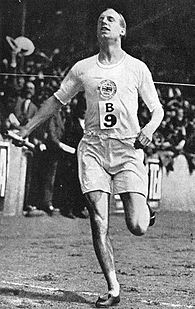Eric Liddell

Eric Liddell at the British Empire versus United States of America (Relays) meet held at Stamford Bridge, London on Sat 19 July 1924.
|
||||||||||||||||
| Personal information | ||||||||||||||||
|---|---|---|---|---|---|---|---|---|---|---|---|---|---|---|---|---|
| Full name | Eric Henry Liddell | |||||||||||||||
| Nationality | Scottish | |||||||||||||||
| Born |
16 January 1902 Tianjin (Tientsin), Qing Empire (China) |
|||||||||||||||
| Died | 21 February 1945 (aged 43) Weihsien Internment Camp, China |
|||||||||||||||
| Sport | ||||||||||||||||
| Country | Scotland, Britain | |||||||||||||||
| Sport | Athletics & Rugby Union (7 tests) | |||||||||||||||
| Event(s) | 100m, 200m, 400m | |||||||||||||||
| Club | Edinburgh University | |||||||||||||||
| Team | Scottish International | |||||||||||||||
| Achievements and titles | ||||||||||||||||
| Olympic finals | 1924 | |||||||||||||||
|
Medal record
|
||||||||||||||||
| Eric Liddell | |||||||||
 |
|||||||||
| Traditional Chinese | 埃里克·利德爾 | ||||||||
|---|---|---|---|---|---|---|---|---|---|
| Simplified Chinese | 埃里克·利德尔 | ||||||||
|
|||||||||
| Transcriptions | |
|---|---|
| Standard Mandarin | |
| Hanyu Pinyin | Āilǐkè Lìdéĕr |
| Wade–Giles | Ailik'e Liteerh |
| Rugby union career | |||||||||||||
|---|---|---|---|---|---|---|---|---|---|---|---|---|---|
| Playing career | |||||||||||||
| Position | Wing-threequarter | ||||||||||||
|
|||||||||||||
|
|||||||||||||
| Amateur clubs | |||
|---|---|---|---|
| Years | Club / team | ||
| National team(s) | |||
|---|---|---|---|
| Years | Club / team | Caps | (points) |
| 1922-23 | Scotland | 7 | (12) |
Eric Henry Liddell (/ˈlɪdəl/; 16 January 1902 – 21 February 1945) was a Scottish athlete, rugby union international player, and missionary, who chose his religious beliefs over competing in an Olympic race held on a Sunday.
At the 1924 Summer Olympics in Paris, Liddell refused to run in the heats for his favoured 100 metres because they were held on a Sunday. Instead he competed in the 400 metres held on a weekday, a race that he won. He returned to China in 1925 to serve as a missionary teacher. Aside from two furloughs in Scotland, he remained in China until his death in a Japanese civilian internment camp in 1945.
Liddell's Olympic training and racing, and the religious convictions that influenced him, are depicted in the Oscar-winning 1981 film Chariots of Fire, in which he is portrayed by fellow Scot Ian Charleson.
Eric Liddell, often called the "Flying Scotsman" after the record breaking locomotive, was born 16 January 1902, in Tientsin, China, the second son of the Reverend and Mrs. James Dunlop Liddell, Scottish missionaries with the London Missionary Society. Liddell went to school in China until the age of five. At the age of six, he and his eight-year-old brother Robert were enrolled in Eltham College, a boarding school in south London for the sons of missionaries. Their parents and sister Jenny returned to China. During the boys' time at Eltham, their parents, sister, and new brother Ernest came home on furlough two or three times and were able to be together as a family, mainly living in Edinburgh.
At Eltham, Liddell was an outstanding athlete, earning the Blackheath Cup as the best athlete of his year, and playing for the First XI and the First XV by the age of 15, later becoming captain of both the cricket and rugby union teams. His headmaster, George Robertson, described him as being "entirely without vanity".
...
Wikipedia
